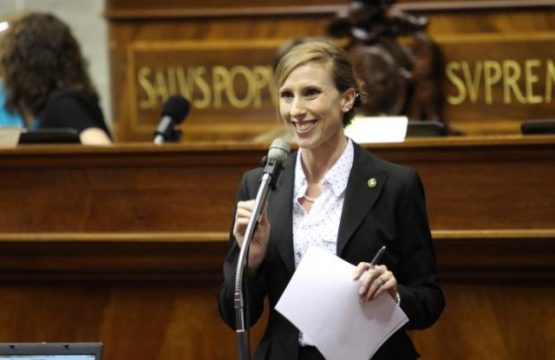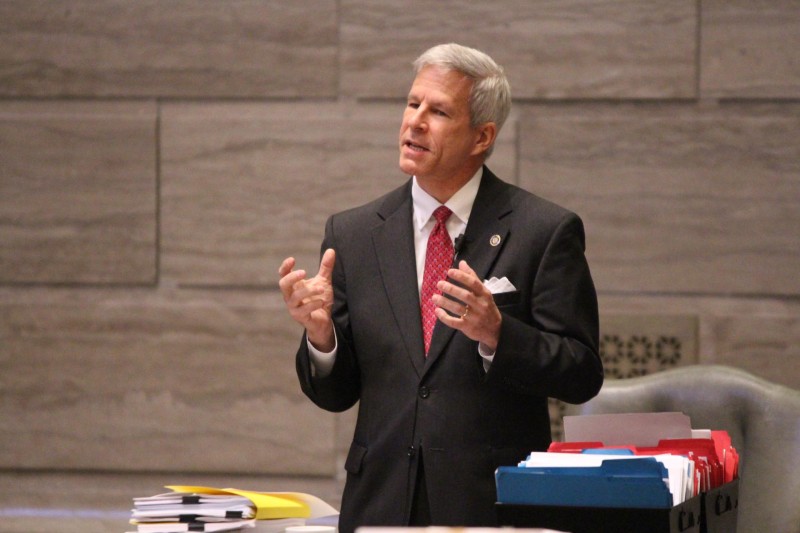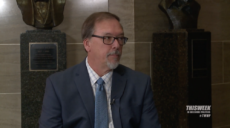JEFFERSON CITY, Mo. – The Senate third read and passed Sen. Rob Schaaf’s own take on a prescription drug monitoring plan (PDMP) Thursday, but it still has competition to become Missouri’s definitive PDMP policy.
In the past few years, Schaaf has proven an immovable object on PDMP legislation offered by Sen. Dave Schatz and Rep. Holly Rehder.* So, this year, he took his own crack at writing a bill to fight the opioid epidemic fueled by the overprescription of opiates like hydrocodone, oxycodone and morphine.
Schaaf, a doctor outside of his legislative duties, acknowledges both the crisis as well as the good intentions behind Schatz and Rehder’s highly similar legislation. However, his bill uses a different mechanism to address the main concern of patient privacy he had with Rehder and Schatz’s bill. Rehder and Schatz’s bills give a lot of latitude to individual doctors, physicians and pharmacists to view data submitted statewide to catch a patient who may in fact be “doctor shopping,” the act of trying to obtain several prescriptions from different providers either to feed an addiction or to peddle to addicts.
Rehder says giving dispensers and physicians the ability to make their own decisions can better help patients who may suffer from an opiate addiction or catch those who may have started becoming addicts.

“To me, the most important part of a PDMP is doctors having that access to see what their patients are on so they can make those medical decisions based on accurate information,” she said last week. “Until we give our physicians the tools that they need to make the right decisions… we’re not going to touch this problem.”
Rehder and Schatz’s bills each have privacy safeguards to protect the data submitted by dispensers, but for Schaaf, that’s not enough. Individual doctors and providers, both in-state and out-state, having that much control over private medical information makes Schaaf uneasy.
“They’re going too far, taking away the people’s liberty with their database,” Schaaf said of Schatz and Rehder’s bill, which Rehder has offered since the 2015 session with support from House leadership. “I’m trying to compromise and come up with a version that protects our liberty a little bit better.”
His bill instead would use a software algorithm to flag potential doctor shoppers when data is submitted. Schaaf argues removing at least that part of the human element from the equation makes the process more objective and lowers the risk of personal information leaks.
“The computer system will identify problems the human brain might not identify,” Schaaf says. “Computers don’t make mistakes, people make mistakes. A well-written computer algorithm can identify every single problem in the data whereas a physician looking at the data might miss something.”
However, Schatz disagrees that Schaaf’s bill represents compromise. He said he appreciated the senator’s willingness to craft some kind of legislation dealing with the problem, especially after so many years of serving as a road block. But, Schatz also says the legislation Schaaf presented came entirely from Schaaf’s own ideas, not any kind of input from Schatz or Rehder.
Schatz’s bill, SB 314**, will likely still get heard in the Senate, it is currently on the formal calendar. The senator believes his bill falls more in line with what multiple counties across the state have already done to establish PDMPs. St. Louis City and County, as well as Boone, Ste. Genevieve, St. Charles, Ste. Genevieve, Jackson, and Cole Counties all have their own plans in place, and some municipalities, most notably Arnold in Jefferson County, have also taken up the plan. More than half of the state’s population is currently under some kind of PDMP plan.
“What’s evident is what’s going on outside the Legislature,” Schatz said. “With the failure to act, obviously counties have taken it on themselves to move forward with what they believe is in their best interest to curb some of the problems that exist with prescription drugs.”
To impress that point, Rehder says whatever statewide framework adopted by the General Assembly and put into law would override what those counties have passed, so Schaaf’s bill could have a serious impact on what those counties have already determined is best for their citizens.
So, for Rehder, simply having some form of PDMP on the books, especially Schaaf’s bill, is not good enough. She and Schatz want the physicians on the front lines of the epidemic to have more access to do what they do best: fight disease.
“It’s not about having a win, it’s about having good policy that can address this huge, huge problem,” she said. “I can’t be okay passing something that doesn’t touch that main problem.”
*– Sen. Jill Schupp and Rep. Fred Wessels have had similar bills molded into the legislation moved through their respective chambers.
** – Schatz also filed SB 231, another bill to establish the Narcotics Control Act, as well. It is currently languishing in Schaaf’s committee as Schaaf has not brought up the measure for a vote in executive session.
















